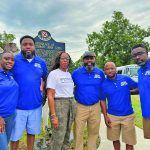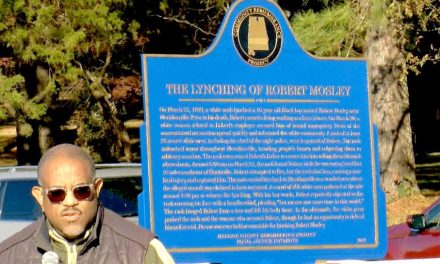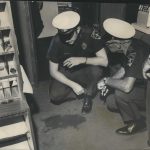Armmon Carter, far right, and other board members with the John R. Lewis Legacy Institute, in front of a historic marker they erected at the site of the Lewis family home near Troy, Alabama. (PROVIDED)
” data-medium-file=”https://www.birminghamtimes.com/wp-content/uploads/2024/04/WALK-300×225.jpg” data-large-file=”https://www.birminghamtimes.com/wp-content/uploads/2024/04/WALK-1024×768.jpg” />
Special to The Times
Growing up, Armmon Carter knew John Lewis as an older cousin who’d come home from time to time to visit his family back in Troy, Alabama. Even though Lewis by then was a Georgia congressman, his visits home were low-key.
It took years before Carter realized that his cousin from just down the road was a very big deal, a legend of the Civil Rights Movement who participated in sit-ins and Freedom Rides, worked alongside other icons like Dr. Martin Luther King Jr., helped organize the March on Washington, and led the first attempted Selma-to-Montgomery march, a pivotal event that became known as Bloody Sunday and helped spur Congress to pass the Voting Rights Act in 1964.
“It wasn’t until I was older that it really hit me what an impact he’d had, not just on our country, but on the world,” said Carter, whose grandfather was the brother of Lewis’ mother.
Carter serves on the board of the John R. Lewis Legacy Institute, a nonprofit created in 2021 to continue his cousin’s work through community engagement and service projects. As part of the institute’s three-fold mission – to advance social justice, education equity and health awareness — Carter will participate in the Pancreatic Cancer Action Network’s annual walk in Birmingham at Railroad Park on April 27 at noon.
Lewis died of pancreatic cancer in 2020, and Carter said the walk is an opportunity to raise awareness about pancreatic cancer, which disproportionately affects African Americans. While pancreatic cancer is the third-leading cause of all cancer deaths in the U.S., the rate of diagnosis and death is higher among Blacks than any racial group.
“Bridging disparities, including health disparities, is a key part of our mission,” said Carter, who lives in Trussville. “Our focus is on education and early detection. With pancreatic cancer, there is no screening, and many people are diagnosed at a later stage when little can be done. We realize how dire the situation is, and we’re all about partnering with community organizations to make a difference.”
Family members associated with the Lewis institute participated last year in PanCAN’s PurpleStride walk in Atlanta. This is the first year the organization will participate in Lewis’ home state of Alabama, too. Its team is called “The Good Troublemakers” – after one of Lewis’s famous quotes “…never, ever be afraid to make some noise and get in good trouble, necessary trouble.”
Speakers for the walk, which opens at 1 p.m., include Rep. Terri Sewell, considered Congressman Lewis her mentor and who lost her mother to pancreatic cancer in 2021. London Koi, a 11-year-old recording star, will perform the national anthem. Others scheduled speakers are Kathy Polk, a local pancreatic cancer survivor, and Dr. Bart Rose from UAB’s O’Neal Comprehensive Cancer Center.
The event is designed to raise awareness and funds for research. Walk organizers are highlighting the involvement of Congressman Lewis’ family through a postcard.
“We can make a difference in the lives of pancreatic cancer patients nationally by taking action locally when we come together on April 27,” Annie Johnson, Chair of PanCAN’s Alabama Affiliate, said in a press release. “There is a critical need for more awareness and research for pancreatic cancer and the money we raise through PanCAN PurpleStride will help make an impact.”
Carter hopes the PanCAN walk at Railroad Park will increase visibility and community partnerships for the John R. Lewis Legacy Institute in Birmingham. “We’re hoping to be able to expand some of our programming in Birmingham,” he said. “This event is hopefully a way to jump start that.”
Some examples of the institute’s work include an early childhood literature program it calls “Trenchcoats and Backpacks,” Carter said. Volunteers go into K-12 schools to spend time with students of all ages, educating them about Congressman Lewis, the Civil Rights Movement and reading in general.
Its “Camp Promise” program hosts male high school students at college campuses for a two-and-a-half day intensive summer program covering subjects including health education, career planning, workforce preparation, and financial literacy.
Carter said the institute’s programs provide not only practical guidance for students but also inspiration at a time when many young people are unaware or skeptical about their ability to make a difference. “A lot of kids we encounter don’t have a lot of knowledge about what happened in their state,” Carter said.
Lewis’ story opens students’ eyes to what happened in the past and what is possible in the future. “He was not very much older than them when he first got his start,” Carter said. “That tells them, ‘You’re never too young to make a difference. Even one man can help change the world.’”
For more information, visit https://www.johnrlewisinstitute.org or follow the organization on Facebook and Instagram. For more information on the Pancreatic Cancer Action Network, visit pancan.org or follow PanCAN on Twitter, Instagram and Facebook.












